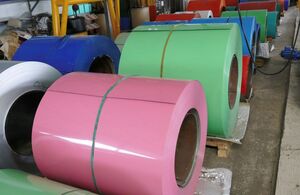TRA initiates reviews into organic coated steel from China
The Trade Remedies Authority has initiated transition reviews into anti-dumping and countervailing measures on organic coated steel from China.

The Trade Remedies Authority has today (15 April 2024) initiated transition reviews into anti-dumping and countervailing measures on organic coated steel from China.
Organic coated steel is used to maintain the durability of various structures, especially in the construction industry, as well as in metal furniture, heating and ventilation ducting and casings and in a number of domestic appliances.
The TRA will be reviewing the anti-dumping and countervailing measures inherited from the EU to determine whether they are still suitable for the UK’s needs. The current anti-dumping duty on the above goods ranges between 5.9% and 26.1% with a residual rate of 13.6%. The current countervailing duty ranges from 13.7% and 29.7% with a residual rate of 44.7%.
The period of investigation for these transition reviews is 1 April 2023 until 31 March 2024. The injury period is 1 April 2020 until 31 March 2024.
Businesses that may be affected by these measures can register their interest through our public file by 30 April 2024. Interested parties that register after this date may not be able to participate fully in the reviews. Any new case developments will be posted on the TRA’s public file.
Notes to editors
- The Trade Remedies Authority is the UK body that investigates whether new trade remedy measures are needed to counter unfair import practices and unforeseen surges of imports.
- Trade remedy investigations were carried out by the EU Commission on the UK’s behalf until the UK left the EU. A number of EU trade remedy measures of interest to UK producers were carried across into UK law when the UK left the EU and the TRA has been reviewing these to assess whether they are suitable for UK needs.
- Anti-dumping duties allow a country or union to act against goods which are being sold at less than their normal value – this is defined as the price for ‘like goods’ sold in the exporter’s home market.
- Countervailing, or subsidy duties counteract imports being subsidised by their place of origin that cause material injury to a domestic industry.